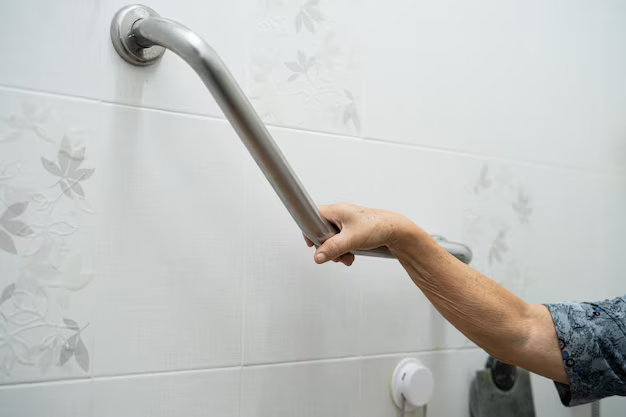Your Guide to Does Medicare Pay For Shower Chairs
What You Get:
Free Guide
Free, helpful information about Medicare Insurance and related Does Medicare Pay For Shower Chairs topics.
Helpful Information
Get clear and easy-to-understand details about Does Medicare Pay For Shower Chairs topics and resources.
Personalized Offers
Answer a few optional questions to receive offers or information related to Medicare Insurance. The survey is optional and not required to access your free guide.
Can Medicare Help You Afford a Shower Chair?
Navigating the complexities of health care coverage can often feel like swimming upstream without a paddle. One common concern among Medicare recipients is whether Medicare pays for shower chairs—a crucial item for many individuals aiming to live independently and safely at home.
Does Medicare Cover Shower Chairs?
Medicare is divided into several parts, each covering different types of services. Medicare Part A (Hospital Insurance) and Medicare Part B (Medical Insurance) do not cover shower chairs, mainly because these are classified as items for personal convenience rather than medical necessity under their criteria.
Medicare Part B has a more focused scope on medically necessary equipment—known as Durable Medical Equipment (DME)—such as walkers, wheelchairs, and hospital beds. For an item to be classified as DME, it must meet certain conditions: it must be durable, used for a medical purpose, not typically useful to someone who isn't sick or injured, and have at least three years of expected usage.
Alternative Coverage Options
While Original Medicare may not cover shower chairs, individuals enrolled in Medicare Advantage Plans (Part C) might have additional options. Private insurance companies offer these plans, and they sometimes include extra benefits beyond what Original Medicare provides, which could cover a wider array of home safety equipment.
If your Medicare Advantage Plan doesn’t cover shower chairs or if you’re on Original Medicare, consider the following alternatives:
- Medicaid: If you qualify, Medicaid might offer more flexible options for coverage of shower chairs as part of long-term care or home health services.
- Veterans Benefits: Veterans may find assistance through the Department of Veterans Affairs, particularly if the chair is deemed necessary for safety and health.
- Non-Profit Organizations: Some local or national nonprofits may offer free or low-cost durable medical equipment to seniors in need.
Financial Assistance and Resources
Addressing costs outside of healthcare is where financial aid comes into play. There are numerous other programs designed to ease financial burdens related to medical and daily living expenses:
Exploring Further Financial Aid and Support
- Supplemental Security Income (SSI): Provides cash to meet basic needs for food, clothing, and shelter.
- State Health Insurance Assistance Program (SHIP): Offers counseling and assistance regarding health insurance decisions.
- Low Income Home Energy Assistance Program (LIHEAP): Helps cover energy costs to ensure comfort and hygiene, essential when using electrically powered equipment.
- Credit Counseling Services: Supports managing debt incurred from medical expenses.
- Educational Grants: For those pursuing careers in geriatric care, scholarships and grants can provide financial support.
Using these programs and resources can alleviate the financial pressure associated with both medical necessities and other essential living expenses. Always review your specific plan details and consult with a health care advisor to maximize your benefits and explore the best options available to you.
Quick Resource Guide
- 💸 SSI: Financial assistance for low-income seniors.
- 🏠 SHIP: Free health insurance counseling.
- ⚡ LIHEAP: Helps cover home energy costs.
- 🧾 Credit Counseling: Manage and relieve medical debt.
- 🎓 Educational Grants: Scholarships for healthcare training.
While navigating these programs might seem daunting, proactive research and consultation with experts can unlock invaluable resources tailored to your individual healthcare and financial needs.
What You Get:
Free Medicare Insurance Guide
Free, helpful information about Does Medicare Pay For Shower Chairs and related resources.

Helpful Information
Get clear, easy-to-understand details about Does Medicare Pay For Shower Chairs topics.

Optional Personalized Offers
Answer a few optional questions to see offers or information related to Medicare Insurance. Participation is not required to get your free guide.


Discover More
- Am I Elgible For Medicare
- Am I Enrolled In Medicare
- Am I Qualified For Medicare
- Are Adult Diapers Covered By Medicare
- Are Chemotherapy Drugs Covered By Medicare Part d
- Are Colonoscopies Covered By Medicare
- Are Covid Tests Covered By Medicare
- Are Cpap Machines Covered By Medicare
- Are Cpap Supplies Covered By Medicare
- Are Dental Implants Covered By Medicare
